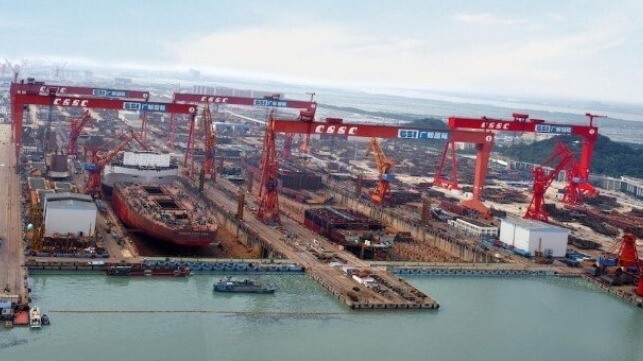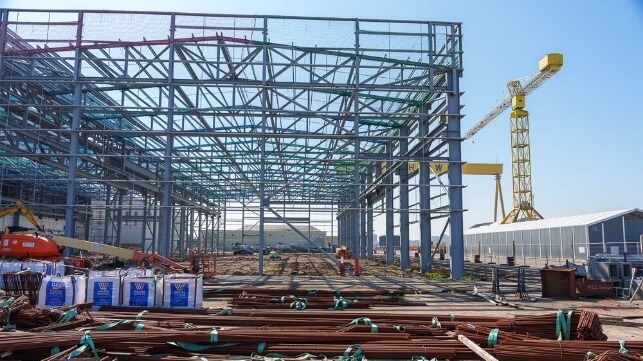Chinese Shipbuilders Feel "Big Relief" After US Softens Port Fee Plan

The revised, less stringent terms of the U.S. Trade Representative's fee plan for Chinese-built ships are an encouragement for China's shipbuilders, multiple shipping sources have told SCMP this week. Though the USTR's initial proposal dampened foreign owners' interest in buying Chinese-made tonnage in the first quarter, the recalibrated financial penalties and the full exclusion of many vessels in the new version gives China's shipbuilding yards reason for optimism - especially as the White House is now signaling its willingness to negotiate down its demands on trade.
The new, more detailed version of the USTR's proposed rule covers much less of the world fleet than the first version. Most importantly, it now exempts most non-Chinese vessels from the fee structure. Before, an owner with Chinese ships anywhere in its fleet would get billed for every U.S. port call, even if using its non-Chinese ships to call in the United States. Under the revised USTR plan, the owner can separate out its Chinese-built ships for use in overseas trade, use all its other ships for port calls in the U.S. market, and avoid any of the fees - while still buying and using Chinese tonnage.
The revision also contains broad exemptions. Most vessels arriving in ballast will not be charged, and all vessels smaller than a Panamax (55,000 dwt, 4,000 TEU for a boxship, or 80,000 dwt for a bulker) are fully exempt.
For Chinese ships that do get billed, the fees are also less onerous: they are now assessed once per visit to the U.S., not for each port call in a string, and only up to five times per ship per year. The charges are also calibrated by vessel size now, removing a disproportionate impact on smaller vessels.
"[It] is a big relief for Chinese shipbuilders, as it significantly alleviates clients’ concerns about placing orders," a senior analyst at a Chinese state shipping firm told SCMP, estimating that about 60 percent of China's current orderbook would not be subject to tariffs.
The relief comes just in time for China's yards, notably in the dry bulk segment. Bulker orders dropped by more than 90 percent in the first two months of the year, according to BIMCO. Top shipbroker Howe Robinson reports just 39 newbuild bulker contracts signed in the first quarter anywhere in the world, down from 213 the year before. Chinese yards received just 13 of these orders, according to Xinde.
The day after the USTR's revised plan was released, specialist yard China Merchants Industry Group announced plans to start building general-purpose bulk carriers and boxships through the purchase of an existing shipyard, Qingdao Yangfan Shipbuilding Co.
Navantia Accelerates Investments in Harland & Wolff and UK Shipbuilding

Three months after completing the acquisition of the bankrupt Harland & Wolff shipyard in Belfast and the other yards of the group, Spain’s Navantia outlined its plans for increased investment to create what it is calling one of the “UK’s most advanced shipyards.” The investments that are intended to improve productivity, provide faster delivery, and more sustainable manufacturing processes as designed to position the UK group as the UK and European governments are increasing defense spending.
Navantia partnered with Harland & Wolff in 2023 to win a UK contract to build three naval support ships for the Royal Navy Auxiliary. As part of that program, the companies committed to an investment of £77 million ($100 million) to modernize the yards and increase capabilities for the Fleet Solid Support (FSS) contract. The Spanish group stepped in in late 2024 to save the UK shipyard group from liquidation and maintain the FSS program reporting that it would increase the planned investment in the yards.
“The modernization program will significantly enhance the Belfast yard’s ability to build the FSS vessels and support future programs,” said Navantia UK detailing its plans. “The investment is designed to deliver a comprehensive regeneration of UK shipbuilding capabilities, leveraging the opportunity presented by the FSS program.”
Assembly work and outfitting for the three FSS vessels is slated to take place at the yard in Belfast. The Appledore shipyard is producing the bow sections for the vessels. Work on the upgrades had begun in 2024, but was suspended due to the group’s financial troubles. Navantia UK reports that work resumed in March.
According to the group, the modernization focuses on maximizing productivity, creating jobs, and implementing sustainable manufacturing. Phase one focuses on enhancing capabilities for building vessel hulls, with improvements to delivery systems, stockyard management, and cutting technologies. It includes a comprehensive upgrade both for infrastructure development and advanced equipment installation. It will feature new lifting cranes, robotic plasma cutting systems, and automated quality control processes. A fully mechanized panel line for flat panel units will be installed, while the Belfast shipyard’s iconic Samson and Goliath gantry cranes will continue to play a vital role in operations.
The investment program extends beyond Belfast, with significant upgrades at the Appledore shipyard in Devon. The company has already committed to purchasing an advanced plasma cutter with expanded bed dimensions and sophisticated bevel-cutting capabilities, replacing machinery that has served the facility for more than 20 years.
Navantia UK’s investment strategy also encompasses the Scottish facilities at Arnish and Methil, which specialize in the energy industries. At Arnish, investment has begun including on skills development infrastructure, featuring a new welfare facility, dedicated training center establishment, office space improvements, and enhanced security and parking provisions.
Juan de la Cueva, CEO of Navantia UK, called the investments a “watershed moment” for UK shipbuilding. He said it was part of a long-term commitment to UK shipbuilding. Harland & Wolff they said will be transformed into a cutting-edge facility capable of delivering the highest quality vessels. The Belfast yard was once an industry leader but entered a long decline delivering its last new build in 2009 and saved from a prior bankruptcy in 2019. Similarly, the Appledore shipyard went into receivership in 2003 and finally closed in 2019 before being acquired by Harland & Wolff Group in 2020. The group acquired the two smaller yards in Scotland in 2021.
No comments:
Post a Comment